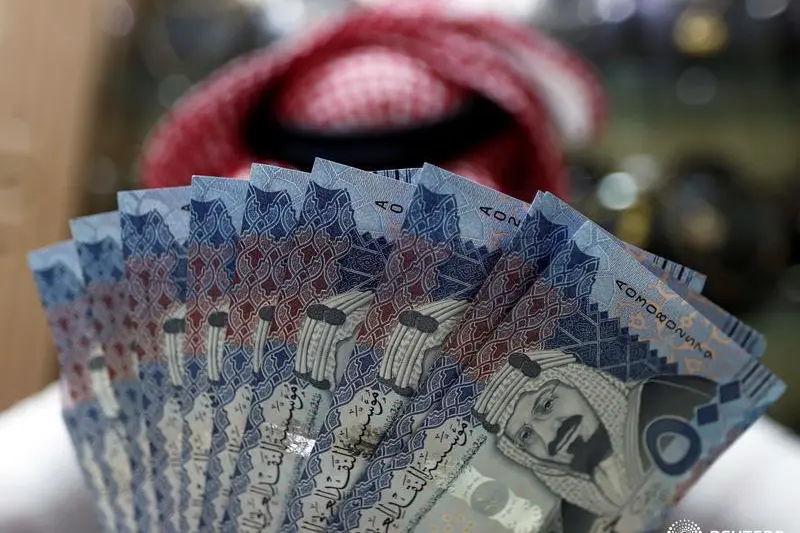PHOTO
DUBAI - The Saudi Arabian central bank's foreign reserves rose in November for a second straight month, in a sign that higher oil prices may be reducing pressure to draw them down, official data showed on Thursday.
The bank's net foreign assets expanded by $1.0 billion from October to $486.9 billion last month, after increasing $8.3 billion in October. It was the first time since mid-2014 that the reserves rose for two consecutive months.
The government has been liquidating the reserves, which peaked at $737 billion in August 2014, to cover a big budget deficit caused by low oil export receipts; a 15 percent jump in oil prices in the past three months has improved state finances.
However, economists believe Riyadh has also been diverting some of the assets to build up its top sovereign wealth fund, the Public Investment Fund, which is taking a key role in developing the economy. Changes in the pattern of these transfers, rather than higher state revenues, may be boosting the reserves.
Also, the U.S. dollar fell against many other currencies in November, inflating the value of the non-dollar portion of the reserves.
The foreign assets are held mostly in the form of securities holdings and bank deposits, both of which edged up in November.
Thursday's data also showed outstanding bank loans to the private sector shrank 0.6 percent from a year earlier in November, the ninth straight month of falling bank lending.
The data did not show clear signs of a major increase in capital outflows from Saudi Arabia after the government launched a sweeping crackdown on corruption in early November.
Dozens of princes, senior officials and top businessmen were detained, triggering selling in the stock market by retail investors and raising fears that individuals could shift large sums out of the country and the region to escape the crackdown.
Saudi commercial banks' total deposits were almost unchanged in November, however, while banks' sales of foreign exchange for purposes such as personal transfers by Saudi citizens did not rise sharply.
The central bank froze hundreds of bank accounts during the crackdown and kept a close watch on many bank transactions, commercial bankers told Reuters, deterring people from moving money abroad for fear of attracting authorities' attention.
(Reporting by Andrew Torchia; Editing by Gareth Jones) ((andrew.torchia@thomsonreuters.com; +9715 6681 7277; Reuters Messaging: andrew.torchia.thomsonreuters.com@reuters.net))
The bank's net foreign assets expanded by $1.0 billion from October to $486.9 billion last month, after increasing $8.3 billion in October. It was the first time since mid-2014 that the reserves rose for two consecutive months.
The government has been liquidating the reserves, which peaked at $737 billion in August 2014, to cover a big budget deficit caused by low oil export receipts; a 15 percent jump in oil prices in the past three months has improved state finances.
However, economists believe Riyadh has also been diverting some of the assets to build up its top sovereign wealth fund, the Public Investment Fund, which is taking a key role in developing the economy. Changes in the pattern of these transfers, rather than higher state revenues, may be boosting the reserves.
Also, the U.S. dollar fell against many other currencies in November, inflating the value of the non-dollar portion of the reserves.
The foreign assets are held mostly in the form of securities holdings and bank deposits, both of which edged up in November.
Thursday's data also showed outstanding bank loans to the private sector shrank 0.6 percent from a year earlier in November, the ninth straight month of falling bank lending.
The data did not show clear signs of a major increase in capital outflows from Saudi Arabia after the government launched a sweeping crackdown on corruption in early November.
Dozens of princes, senior officials and top businessmen were detained, triggering selling in the stock market by retail investors and raising fears that individuals could shift large sums out of the country and the region to escape the crackdown.
Saudi commercial banks' total deposits were almost unchanged in November, however, while banks' sales of foreign exchange for purposes such as personal transfers by Saudi citizens did not rise sharply.
The central bank froze hundreds of bank accounts during the crackdown and kept a close watch on many bank transactions, commercial bankers told Reuters, deterring people from moving money abroad for fear of attracting authorities' attention.
(Reporting by Andrew Torchia; Editing by Gareth Jones) ((andrew.torchia@thomsonreuters.com; +9715 6681 7277; Reuters Messaging: andrew.torchia.thomsonreuters.com@reuters.net))





















